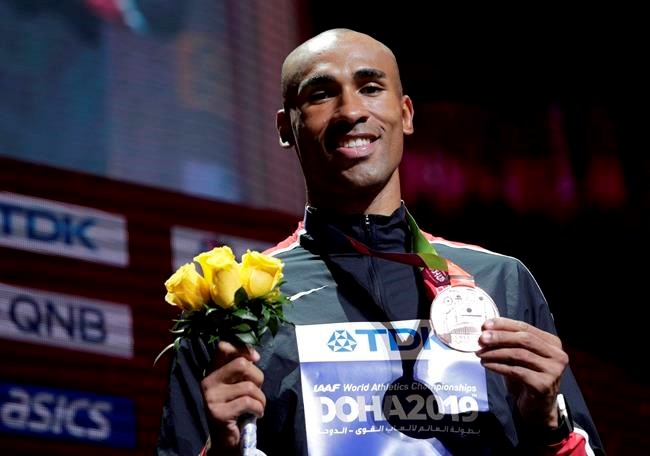Damian Warner says becoming a dad has made him appreciate his mom that much more.
The Olympic decathlon bronze medallist and longtime partner Jen Cotten, a former national team hurdler, welcomed son Theo on March 11, and the whirlwind few weeks as bleary-eyed new parents had Warner reflecting on his own childhood on Wednesday.
"I've always been super appreciative, but my mom raised me, my brother and my sister, just essentially by herself, and that couldn't have been easy," Warner said of his mom Brenda, who often held down two nursing jobs in long-term care homes to support them.
"Me and Jen, we have my mom's help, and Jen's mom's help. Everybody's helped. So, it's tough to understand what my mom would have had to go through."
It's been a roller-coaster year for the 31-year-old Warner. COVID-19 brought international competition to a screeching halt last spring — particularly for Canadian athletes facing tight travel restrictions — and then forced the closure of Warner's indoor training facility at Western University in London, Ont.
But Theo has brought a welcomed sense of balance, Warner said, not just from the pandemic and its unprecedented challenges, but the demands of being a world-class multi-events athlete months out from the Olympics.
"I've always been able to use track as kind of a getaway; whatever you have going at home, you can go to track and focus on that," Warner said. "But then, as time went on, other things became much more prevalent and kind of distracting, so sometimes you show up at the track, and you bring those other things with you.
"It's kind of cool now where I can do track and then I come home and I have a completely different life. I can kind of take a break from track and the stresses of pole vault or high jump or shot put or whatever is tough at that time, kind of just go away because I have a completely different task at hand. And I've been enjoying that."
Decathletes are considered among the world's toughest athletes. Their gruelling Olympic schedule is 10 events over two days, ending with a lung-busting 1,500 metres that has runners wobbling across the finish line.
Warner is curious to see how Theo has changed his perspective.
"I have my first decathlon in a month, so I imagine I'll go in there and be like, 'You know what? Throwing shot put's not that hard,'" he said with a laugh. "It's definitely added like a new excitement to my life, coming home and seeing him and he's two months this week, which is crazy.
"It's just crazy to see how fast he's growing. One week he doesn't have eyelashes. The next week he has eyelashes, and all of sudden he's smiling and laughing and looking around. It's been a really cool thing to witness."
Warner hasn't competed in a decathlon since the 2019 world championships in Doha, Qatar.
"It feels like 10 years," he said.
Warner won bronze in Doha despite ankle injuries that hampered his training leading into the world championships. The long layoff from competing, at least, has given him time to heal, and his current workouts are showing he's in great shape.
He plans to compete at the prestigious Hypo-Meeting in Gotzis, Austria, May 29-30 — and can't wait.
"I follow track and field obviously a ton, and they've had competitions in the United States and Europe, and I've been watching these for the last little while and thinking: when's it going to be our turn?
"It's nice to have an X on the calendar we can mark and say we're going to be traveling here, we're going to be competing here, it brings you back to a little bit of normalcy. And even just seeing people and being around other athletes, it's been awhile, so I'm excited."
Spring weather has meant Warner can train outside finally after months spent in a chilly hockey arena. After being locked out of the university facilities, numerous people in London came together to assemble a facility for Warner and his training group inside Farquharson Arena. Space heaters were brought into the spartan building, which had been flagged for potential demolition over a decade ago.
A normal year would have seen Warner and coaches spend a chunk of the winter enjoying warm-weather training in the U.S.
Western is undergoing construction on its outdoor track, and so Warner is splitting his workouts between several high school tracks.
"It's kind of been a juggling act, but we've been able to make it work," he said.
Warner was one of the athletes introduced Wednesday as part of Empire Company Limited's "Feed the Dream" campaign, which will see $1 million divided between Canada's Olympic and Paralympic athletes in the form of grocery cards.
Warner has no idea how many calories he consumes in a day. Safe to say it's a lot.
"This 'Feed the Dream' campaign is pretty awesome, because it goes right to the athletes," Waner said. "Giving grocery cards to the athletes is the most practical thing that any company's done (in his two Olympics), because it's something that every single athlete will be able to use and it will benefit their training."
This report by The Canadian Press was first published May 5, 2021.
Lori Ewing, The Canadian Press




